Ticket to Ride: All aboard the nerd train
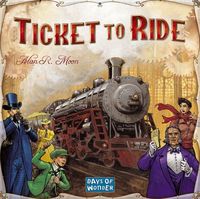
In the world of serious board gamers there's a common thread of conversation that you see out there: How do I get people who don't want to play games with me to play games with me? Since coercion and bribery aren't ideal, there's this subset of games that people often referred to as gateway games. These games are typically easy to learn, have an attractive design, and offer more strategy than your typical off-the-Meijer-shelf board game. Gateway games are good games by themselves that can also serve as stepping stones to more complex games.
For some reason, most of nerd-kind has decided that Ticket to Ride is the ultimate gateway game. For newer board gamers, we'll take a look at how it plays and for more experienced gamers who somehow made it this long without playing Ticket to Ride, we'll see if it's worth your money now.
Ticket to Ride is a game about playing trains to earn as many points as possible by completing routes between cities. Before we look at how the game plays, you'll need to have a look at the board.
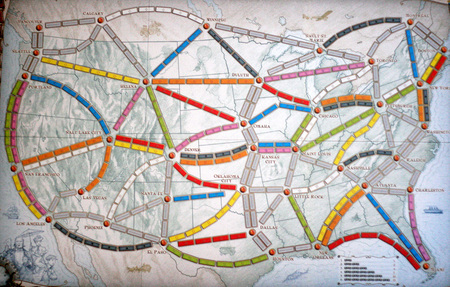
Mike Hulsebus | Contributor
At the start of the game, you get 3 route cards and have to keep at least one of them. Each route card has two cities that the player would have to connect (for example: Sault Ste. Marie and Nashville) and the amounts they would earn for connecting those cities. In order to connect the cities to one another, the players will have to acquire and play cards of the correct color.
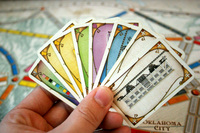
Players maintain a hand of cards that they can trade in to claim routes when they have enough of a given color.
Mike Hulsebus | Contributor
So let's say we're trying to connect Sault Ste. Marie to Nashville. If we wanted to claim the four spaces between Nashville and Pittsburgh, we would need to get four yellow cards into our hand and then play them on our turn. To gain cards on future turns, a player can take any two of the 5 face-up cards available on a turn, or may also opt to draw from the face-down cards and hope to get the color he needs.
Once we collect four yellow cards, we use a turn to play those cards and put 4 of our 45 trains on those spaces. In addition to getting us closer to our goal, this also earns us points based on the length of the route. Players are rewarded for claiming longer sections of track (for example, a 2-train leg scores 2 points while a 3-train leg scores 4 points), so players can figure out if they want to try and complete a lot of route tickets or if they would rather go for the big point spaces (a 6-space leg is worth 15 points in and of itself which is more than some routes).
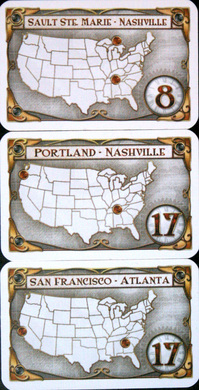
Route cards show the points a player can earn for connecting the cities on the card. A player choosing between these cards may want to take both cards with Nashville since he can make one long route with both connections.
Mike Hulsebus | Contributor
Spaces that are gray can be claimed with any cards, so long as they're all the same color, and some legs can have more than one person on depending on how many players are playing. Even with the adjustments made for differing player amounts, there will be more conflict for cities with more players.
Players keep their routes a secret, so there are times when players will all be trying to go through a few sections of the country at once and have to fight for the ideal routes. Even if you get blocked off, however, you'll usually be able to make it through to your destination, you likely will just need to take a longer way around.
The game seems like it could get mean quick, but it really doesn't unless you've got someone who's really malicious. Yes, I could spend all my turns trying to make life difficult for someone, but that means I'll probably have to take lower point legs and use up all my train cards doing so, taking myself down in the process. Furthermore, whoever makes the longest route gets an extra 10 points at the end of the game, so players don't typically want to segment their track all over the place for no reason.
The game ends when one player has fewer than 3 trains left at which point everyone gets to take one final turn.
I like Ticket to Ride. I think it's a great game for using to introduce people to games that are something more than just rolling a die and moving your piece that many spaces. It's simple enough to teach that you could play it with just about anyone, yet interesting enough that die-hard nerd gamers aren't going to get bored.
For people looking for a more complex experience, there are a number of different maps available that add special rules and new strategies to the game, though I myself haven't played any of them (but would like to).
Ticket to Ride serves its purpose well. Other people might suggest Settlers of Catan as a gateway game, but I really think that the great thing about Ticket to Ride is that even if you've played the game 10 times, you won't have too much of an advantage over someone who is just learning, so I find the game considerable more welcoming. It's fun to go and build your routes while trying to look at secondary options if you get blocked off, and the game is a good length for what it is. If trains aren't your cup of tea, you way also want to check out my reviews for Zooloretto or Forbidden Island for other easy-to-pick-up games. Or, if you're sick of reading what I have to say, plenty of other people out there have their opinions on what the best gateway games are.
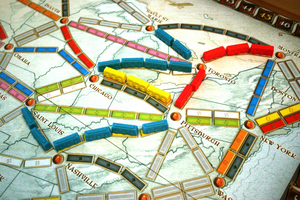
Cut off from Pittsburgh to Toronto, blue begins to reroute through Chicago.
Mike Hulsebus | Contributor
For the gamers out there, I'm not sure if your gaming dollar may be best spent here. I think if you have someone you're looking to teach some games or if you need something for a gathering with friends, it's a good purchase that maybe those friends will get more enjoyment out of it than you do after you've played it for a while, though I'm told that some of the other maps may fix that. If you want some more serious games, I can also recommend Dominion or Arkham Horror.
Mike Hulsebus will be here refreshing the page to see if the staff makes him change his subhead to something other than "All aboard the nerd train." To keep him occupied, if you have questions or want some suggestions on games, let's talk in the comments or at mikehulsebus@gmail.com


Comments
Mike Hulsebus
Mon, Jul 12, 2010 : 5:34 p.m.
Thanks Linda! You can see all my posts thus far here: http://www.annarbor.com/cgi-bin/mt/mt-search.cgi?blog_id=1&tag=Mike%20Hulsebus&limit=20 I try to review a variety of games so that people can learn about all sorts of games.
Linda
Mon, Jul 12, 2010 : 4:15 p.m.
I love this article! Mike, do you write other board game reviews?
Mike Hulsebus
Mon, Jul 12, 2010 : 9:55 a.m.
Thanks for the comment, Pittsfield Township. Yeah, I totally agree with you. If you're playing with new gamers that might wait until it's their turn to think about what they want to do, TTR will defintily go a lot faster. As I sort of got to in the article, I also like Ticket to Ride for the fact that Ticket to Ride experts won't utterly trounce new people: it's difficult for a new person in Settlers to figure out "ok, do I want to make this trade?" since they don't have a good way to value things. I really have to admire Settlers for its great resource gathering system and really think it's a great game to figure out with people together. I also just listened to an Episode of The Dice Tower where they all went over how they got into nerd games and a huge percentage of them all started with Settlers rather than Ticket to Ride.
PittsfieldTwp
Mon, Jul 12, 2010 : 9:06 a.m.
I have this and Settlers and like them both. What I especially like about Ticket to Ride is you are allowed to only do one thing in a turn and that keeps things moving quickly and keeps you in the game better when 3 or more people are playing.